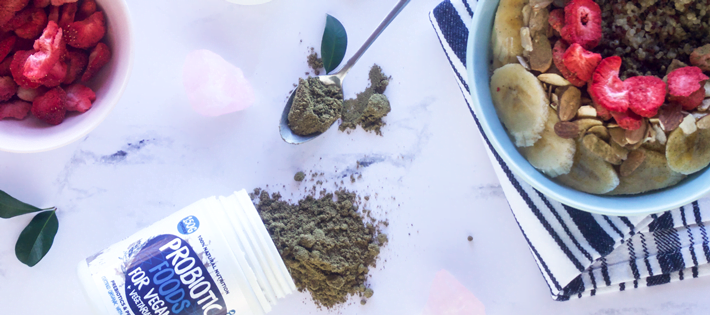To all our dedicated vegans and vegetarians we have great news. Our Probiotic Foods for Protein has been given a fresh makeover for winter and we named it after you! See it on the shelf with the same dark blue label but now called Probiotic Foods for Vegans & Vegetarians.
As you know, meatless, plant based meals can benefit many bodies, the planet and our resources. Plant based diets can reduce the risk of just about every degenerative disease known to westernised humans—obesity, diabetes, heart disease and cancer. Research also shows that increasing fibre from vegetable sources is one of the fastest ways to feed and boost your good bacteria and reduce the risk of inflammation in the gut.
To become vegan or vegetarian and get the health benefits, requires knowledge, planning and preparation.
Knowledge
The first step is knowing what nutrients you need to emphasise in your vegan diet and then what foods supply them or whether you need a supplement.
These nutrients can be low in vegans and vegetarians:
• Minerals like sulphur, iron, zinc, iodine, calcium and magnesium
• Vitamins including Vitamin B6 and B12, Vitamin A and D
• Essential Fatty Acids—EPA and DHA
• Protein and essential amino acids they contain
Tip: Have a blood test with your health professional who works in nutritional medicine to look at albumin levels and other markers of low protein, and other nutrient deficiencies particularly Vitamin B12, iron and zinc.
Getting the best out of your food and supplements requires good digestion. Our company mantra is, “We are not what we eat, but what we absorb” Don Chisholm. Probiotic Foods for Vegans & Vegetarians contains certified organic wholefoods high in protein that are designed to supply the body with easy to absorb amino acids and nutrients.
The foods in this blend are broken down by a mother culture that contains 12 plus strains of good bacteria. Probiotic Foods not only provides a valuable source of pre-digested protein for growth and repair, production of hormones and enzymes, the probiotics also assists overall digestion. Did you know that chlorophyll in the plants you eat is broken down by these amazing gut bugs to create energy?
This Probiotic Foods for Vegans & Vegetarians can also benefit sports or fitness enthusiasts, pregnant, breastfeeding or busy mums, kids or tennagers and fussy eaters, recovery from injury or illness and seniors struggling to get protein every day.
Planning
Stock your pantry with these nutrient rich foods:
- Pulses—dried peas, beans and lentils are a good source of protein, iron and zinc and contain sulphur based amino acids.
- Green leafy and vegetables—broccoli, kale, rocket for sulphur, magnesium, calcium, iron, folate.
- Fermented soy products like natto and tempeh for vitamin B12, protein, beneficial bacteria.
- Sea vegetables—nori, wakame, for iodine and Vitamin B12.
- Hemp, chia and flaxseed—good source of protein and essential fatty acids.
Wholegrains, like brown/wild/black rice, quinoa and millet, nuts and seeds, like almonds, cashews, Brazil nuts and walnuts, chia, hemp, sesame and pumpkin seeds and eggs are also essential store cupboard staples.
Preparation
If you have a great wok, slow cooker, blender and vegetable spiralizer, food prep can be speedy and enjoyable. Have some canned pulses (organic if possible check they are not lined with plastic) on standby.
Add Probiotic Foods to any of theses foods for a boost of nutrition:
• Dhal with brown rice and coconut yoghurt
• Quinoa porridge with roasted seeds
• Smoothie with hemp protein powder, avocado, blueberries, chia and cacao
• Adzuki, sweet potato and kale curry and wild rice
• Coriander hummus and cashew cheeze
• Miso soup with tempheh, shitake mushrooms and nori/wakame
Wondering exactly how much protein you should be consuming each day as a vegan? The Recommended Dietary Allowance (RDA), which is the minimum amount you need is 0.8 grams per kilogram of body weight per day—46 grams for an average woman, more if you are pregnant, breastfeeding, playing sport or recovering from illness.
Quinoa Porridge Recipe
An nourishing, simple and tasty breakfast option, quinoa is a complete protein as it contains all 9 amino acids. The bonus about this recipe is that it is just as tasty as a mid-morning snack or pop it in a jar and take it to go!
Ingredients (Serves 2)
2 1/2 cups organic coconut or almond milk (no added sugars please!)
1 cup organic quinoa, rinsed
1 tablespoon honey (more or less to your taste)
1/4 cup slivered almonds, toasted
1/2 tsp cinnamon
1 tsp Probiotic Foods for Vegans & Vegetarians
Other nuts, seeds, fruit to top
Bring the quinoa and milk to the boil, turn down the heat and cook until al dente. It will retain a subtle crunch. If required add some filtered water during the cook to ensure it doesn’t run out of liquid before completely cooked. Stir in honey, cinnamon and Probiotic Foods. Pour into 2 bowls, add a splash of extra milk and top with the toasted almonds and desired toppings. Customise to your liking!


